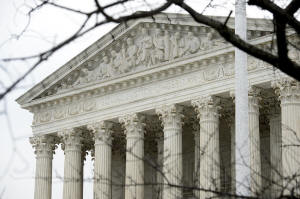Supreme Court upholds Texas law aimed at blocking kids from seeing
pornography online
[June 28, 2025]
By LINDSAY WHITEHURST
WASHINGTON (AP) — The Supreme Court on Friday upheld a Texas law aimed
at blocking children from seeing online pornography.
Nearly half of the states have passed similar laws requiring adult
website users to verify their ages to access pornographic material. The
laws come as smartphones and other devices make it easier to access
online porn, including hardcore obscene material.
The court split along ideological lines in the 6-3 ruling. It's a loss
for an adult-entertainment industry trade group called the Free Speech
Coalition, which challenged the Texas law.
Th majority opinion, authored by Justice Clarence Thomas, found the
measure didn't seriously restrict adults' free-speech rights. “Adults
have the right to access speech obscene only to minors ... but adults
have no First Amendment right to avoid age verification,” he wrote.
In a dissent, Justice Elena Kagan wrote that the court should have used
a higher legal standard in weighing whether the law creates free-speech
problems for adults. “I would demand Texas show more, to ensure it is
not undervaluing the interest in free expression,” she wrote.
Pornhub, one of the world’s busiest websites, has stopped operating in
several states, including Texas, citing the technical and privacy
hurdles in complying with the laws.

Texas Attorney General Ken Paxton, a Republican, celebrated the ruling.
“Companies have no right to expose children to pornography and must
institute reasonable age verification measures,” he said. The decision
could pave the way for more states to adopt similar laws as one of
several steps to prevent children from being exposed to pornography, the
group National Center on Sexual Exploitation said.
While the Free Speech Coalition agreed that children shouldn’t be seeing
porn, it said the law puts an unfair free-speech burden on adults by
requiring them to submit personal information that could be vulnerable
to hacking or tracking.
Alison Boden, its executive director, called the ruling disastrous. She
said that minors have already found ways to find sexual content online
despite the law and its “massive chilling effect on adults.”

[to top of second column]
|

The Supreme Court is seen on Capitol Hill, Feb. 27, 2025, in
Washington. (AP Photo/Rod Lamkey, Jr., File)

The age verification requirements fall on websites that have a
certain amount of sexual material, rather than search engines or
social-media sites that can be used to find it.
Samir Jain, vice president of policy at the nonprofit Center for
Democracy & Technology, said that age verification requirements
raise serious privacy and free-expression concerns. The court’s
decision “overturns decades of precedent and has the potential to
upend access to First Amendment-protected speech on the internet for
everyone, children and adults alike.”
In 1996, the Supreme Court struck down parts of a law banning
explicit material viewable by kids online. A divided court also
ruled against a different federal law aimed at stopping kids from
being exposed to porn in 2004 but said less restrictive measures
like content filtering are constitutional.
Texas argues that technology has improved significantly in the last
20 years, allowing online platforms to easily check users’ ages with
a quick picture. Those requirements are more like ID checks at
brick-and-mortar adult stores that were upheld by the Supreme Court
in the 1960s, the state said.
District courts initially blocked laws in Indiana and Tennessee as
well as Texas, but appeals courts reversed the decisions and let the
laws take effect.
“There has to be a gatekeeper somewhere when it comes to exposure,”
said Rania Mankarious, a mother of three and CEO of Crime Stoppers
of Houston. “While nothing is full proof, we’re thankful to see
something be done.”
___
Associated Press writers Jonathan Mattise in Nashville, Tenn.,
Barbara Ortutay in San Francisco and Nadia Lathan in Austin, Texas
contributed to this report.
All contents © copyright 2025 Associated Press. All rights reserved |